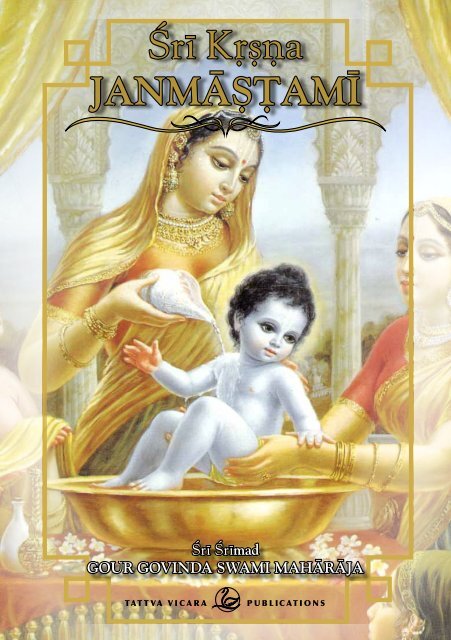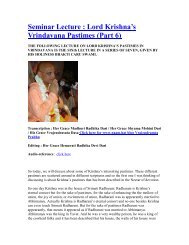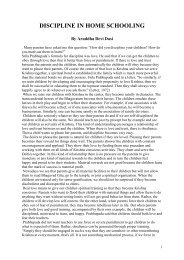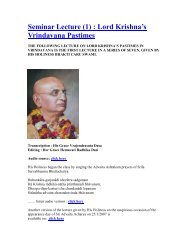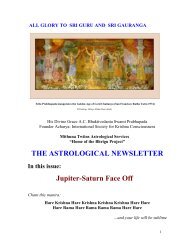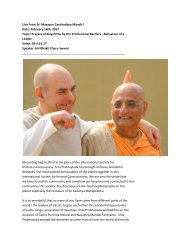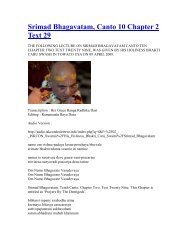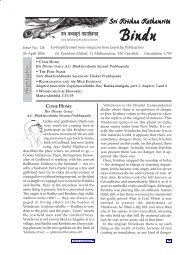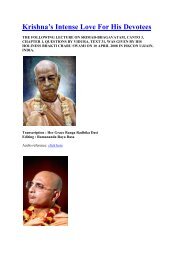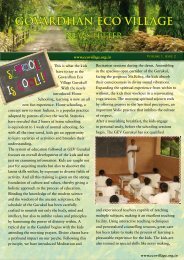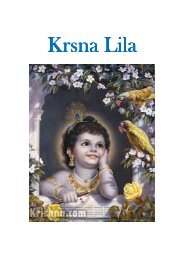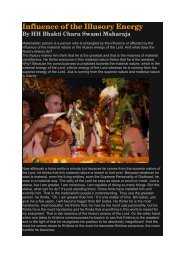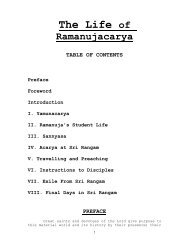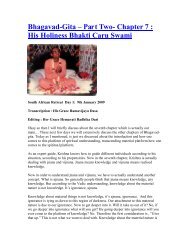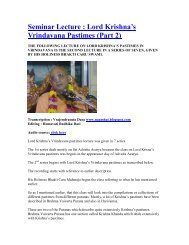Gour Govinda Swami - Sri Krishna Janmastami - ebooks - ISKCON ...
Gour Govinda Swami - Sri Krishna Janmastami - ebooks - ISKCON ...
Gour Govinda Swami - Sri Krishna Janmastami - ebooks - ISKCON ...
Create successful ePaper yourself
Turn your PDF publications into a flip-book with our unique Google optimized e-Paper software.
Çré KåñëaJanmäñöaméÇré ÇrémadGOUR GOVINDA SWAMI MAHÄRÄJA
Çré KåñëaJanmäñöamé
Table of ContentsWhy Kåñëa Descends 2Dvädaçé-Parama-Vrata 3Nanda Mahäräja’s Dream 5The Brahmacäriëé Tapasvé’s Prediction 7How Did Kåñëa Enter the Womb of Yaçodä-Mätä? 8Preparing the Maternity Home 11Yaçodä-Mätä Gave Birth to Kåñëa 12Take Me to Vraja-Gokula 12A Very Confidential Matter 14Präbhava-Prakäça and Vaibhava-Viläsa 16Yaçodä drowned in the Ocean of Blissfulness 17Performing the Jäta-Karma-Saàskära 19Innumerable Moons Have Arisen 21In All Directions Everyone was Dancing 22
Çré KåñëaJanmäñöaméÇré ÇrémadGOUR GOVINDA SWAMI MAHÄRÄJAA lecture delivered by Çré Çrémad <strong>Gour</strong> <strong>Govinda</strong> <strong>Swami</strong> Mahäräja on 18thAugust 1995 Bhubaneswar, India. www.tvpbooks.com
Çré KåñëaJanmäñöaméIn the first three chapters of the tenth canto of Çrémad-Bhägavatam there is a description of the appearanceof Bhagavän Çré Kåñëa. This morning we read theEnglish translation by our revered spiritual master, ÇréÇrémad A. C. Bhaktivedänta <strong>Swami</strong> Prabhupädajé Mahäräja. Inthe evening, Advaita Äcärya prabhu also read the same threechapters in Oriya.In Hari-vaàça there is also a description of Kåñëa’s appearance.In Gopäla-campü, written by Çré Jéva Gosvämé there is also adescription of Kåñëa’s appearance. I will be reciting Gopälacampü,and I have to speak in two languages, first in Oriyathen in English, in this way I will go on. Therefore I requestone and all to sit patiently, quietly and hear with concentratedattention because the hearing of this transcendental lélä-kähäëéof Bhagavän Kåñëa is all-auspicious. The Bhägavatam (1.2.17)describes:D 1 X
Çré Kåñëa Janmäñöaméçåëvatäà sva-kathäù kåñëaù puëya-çravaëa-kértanaùhådy antaù stho hy abhadräëi vidhunoti suhåt satäm“Çré Kåñëa, the Personality of Godhead, who is theParamätmä in everyone’s heart and the benefactor of thetruthful devotee, cleanses desire for material enjoymentfrom the heart of the devotee who has developed the urge tohear His messages, which are in themselves virtuous whenproperly heard and chanted.”Why Kåñëa DescendsThe Bhägavata has said, to hear this transcendental lélä-kähäëéof Bhagavän Kåñëa is all-auspicious. If you hear with full faithand concentrated attention, all of the material contaminationin your heart will be purified. No other means is there. For thisreason Bhagavän Çré Kåñëa descends here, though BhagavänKåñëa has His eternal abode in the spiritual sky, known as saccid-änandamaya-dhäma,a dhäma that is sanmaya, cinmaya,and änandamaya - full of eternality, full of knowledge, andfull of bliss. He is always there, engaged, completely absorbedin transcendental lélä, especially in räsa-lélä He enjoys andrelishes the mellow. Why will He come to this material worldwhich is not His dhäma, abode? It is completely opposite tothat transcendental sac-cid-änandamaya-dhäma. This materialworld is asat-, acit-, and niränanda-mäyä — it is temporary,full of ignorance and misery. Why will He come here? Whatbusiness does He have coming here? He comes because He issuhådaà sarva-bhütänäà — the only well-wishing friend of allliving entities. He has said this in Bhagavad-gétä. From timeimmemorial you have forgotten Kåñëa and have been underthe clutches of mäyä, however Kåñëa has not forgotten you. HeD 2 X
Çré Kåñëa Janmäñöaméis your well-wishing friend. He always runs behind you. He isthere in your heart as Paramätmä. He never deserts you. He alsodescends in many incarnations to this material world along withHis dhäma and His associates and He manifests transcendentalpastimes. The purpose for His coming is so that His lélä-kähäëéswill be recorded in books, and His dear devotees the sädhus,Vaiñëavas, mahäjanas will come, they will recite, speak andpreach these pastimes. Kåñëa’s pastimes should be heard, read,deliberated, and meditated upon. Thereby you will achievepeace and bliss. Your heart will be cleansed and then you willbe able to understand your constitutional position. You are theeternal servant of the Lord, Kåñëa is your eternal master. Kåñëatherefore descends here for kréòärtha, to play with His deardevotees, to relish His lélä-rasa, the mellow of transcendentallélä. In addition He also gives you an opportunity to relish thesepastimes. Moreover, He also comes here for sädhu-saàrakñaëa,to protect His dear devotees. These are the reasons why Kåñëacomes to this material world.Dvädaçé-Parama-VrataSo now I will read from Gopäla-campü, which is in nice songform. I want you to follow it with me. It is nice to sing.“snigdha-kaëöha madhu-kaëöha näme kavi-dvaya /nanda-räja darabare niti géta gäya //eka dina sabhä madhye géta ärambhila /nandaräja yena mate tanaya päila //bahu jaga yajïa nanda putra lägi’ kare /tabu putra nähi haila äpanära ghare //D 3 X
Çré Kåñëa Janmäñöamésaba vraja-väsi ära bandhu-jana yata /nandera santäna lägi’ vrata kaila kata //tabu yadi yaçodära putra nähi haila /duùkha sukhe yaçomaté bhojana chäòila //adho-mukhe dhara tale bosi’ nandaräëé /niravadhi açru pheli’ käïdai’ äpani //dekhi’ gopa-räja baòa duùkha päye mane /prabaddha karaye nanda vividha vacane //vidhatara icchä jähä tähä-i haibe /se putra magiye ämi yajïena phalibe //tabe yaçomaté bole “çuno präëeçvara /ämära hådäya kathä kahiba tomära //saba vrata jaga yajna ämi samarpilu /dvädaçé parama vrata nähi äcärilu” //e hena vacana nanda kariyä çravana /änande utphulla hoi’ vahila vacana //“ohe priye bhälo kathä sunäilä tumi /satya satya ei vrata nähi kailu ami! //tumi sudhä-mukhé sädhvé kahile madhura /püribe avaçya väïchä duùkha ha’be düra” //tabe nija purohite däkiyä änila /dvädaçé vratera vidhi bujhiyä laila” //snigdhakaëöha bole “bhäi, are kibä haila? /ei darabare saba kathä khule ra’la” //D 4 X
Çré Kåñëa JanmäñöaméIn Gopäla-campü it is described that there were two poetsnamed Snigdhakaëöha and Madhukaëöha who daily sang songsin the assembly of Nanda Mahäräja. One day they started singingabout how Nandaräja begot a son. Nandaräja performed manysacrifices to beget a son, but still no son was born. The residentsof Vrajabhümi, who were all his friends, also took up a vrata,(vow) and offered worship so that Nanda Mahäräja could havea son. Still no son was coming. Yaçomaté, the wife of NandaMahäräja, became very distressed. She gave up eating and wasalways sitting, hanging her head down and only shedding tears.Seeing the condition of his wife, Nanda Mahäräja become verydistressed and consoled her in various ways, saying, “Whateveris the will of Providence, that will take place.”His wife Yaçodä-mätä said, “My dear husband, I will tell whatI have thought of in my heart. I have performed many sacrificesand have taken up many vows (vrata), but I have not performedthe dvädaçé-parama-vrata.”Hearing this, Nanda Mahäräja became very happy and said,“Yes, very good. We have not performed this vrata. Thereforewe must do it.”Nanda Mahäräja called his priest and the priest describedeverything to him about the procedures, rules and regulationsto perform this dvädaçé-vrata.Nanda Mahäräja’s DreamThen Madhukaëöha continued singing:nanda-yaçomaté vrata vatsare kaila /vrata çeñe eka baòa susvapna haila //D 5 X
Çré Kåñëa Janmäñöamésvayaà çré hari yena bole prasanna haiya /acire phalibe äçä çuno mana diyä //prati kalpe hai ämi tomära santäna /e kalpa se mata hevä satya boli’ jäno //tomädera gåhe çiçu rüpe kariba vihära /nitya daraçane äçä püribe tomära //e hena madhura svapna dekhe nanda-räya /akasmät nidrä bhaìge baòa duùkha päya //prabhäta haila dekhe däke pakñi-gaëa /räëé saha yamuna-te jäite manana //yathä vidhi snäna kari’ räëéra sahita /däna dite ärambhila äpana häthe ta //päiyä däna änandera sabe pürëa haila /nanda-yaçodära dvaya puccha kori’ vahila //Nanda Maharäja ki jaya!Yaçomaté-devi ki jaya!Nandaräëé ki jaya!gåhete äsiyä nanda çré viñëu püjilanitya karma vidhi yata saba samäpilaati çighra darabare dhuhey praveçilaguru-dvija-püjya-jane vandanä karilaäsi bale snigdhakaëöhä “are, kibä kaila?”madhukaëöhä tabe kathä ärambha karila.D 6 X
Çré Kåñëa JanmäñöaméNanda Mahäräja and Yaçomaté-räëé accepted this vrata andobserved for one year. At the end of the vrata Nanda Mahäräjahad a very nice dream. Lord Hari Himself being very muchpleased said, “Your desire will soon be fulfilled. In every kalpa Icome as your son, and in this kalpa I will also come as your son.I will manifest My childhood lélä in your gåha, home. Every day,seeing My childhood lélä, you will be very happy.”After seeing this wonderful dream Nanda Mahäräja’s sleepbroke. It was morning and birds were chirping. He decidedto take bath in the Yamunä along with his wife Yaçomaté, andNanda Mahäräja took much wealth with him to give in charity.All of the demigods, munis, and åñis came in the guise of beggarsto receive charity from Nanda Mahäräja. Nanda Mahäräjaand Yaçomaté completed their bath, and then started givingcharity. Everyone become very pleased and satisfied to receivecharity from Nanda Mahäräja. They all loudly shouted, “NandaMahäräja ki jaya! Yaçomaté-räëé ki jaya!”Then Nanda Mahäräja returned home and offered worshipto Bhagavän Viñëu. After finishing his nitya-karma, dailyactivities, he came to his assembly, and offered respect to all theworshipable personalities, respected gurus and brähmaëas.After that, again Snigdhakaëöha asked, “What happenedthen?” Then he started singing.The Brahmacäriëé Tapasvé’s Predictionräja-darabare nanda yakhana vasila /dväré kahe “räjä! dväre tapasvé äila //saìge brahmacäré haya sundara darçana /brahmacäriné saìge ati manorama” //D 7 X
Çré Kåñëa Janmäñöamédväréra vacane nanda gätra-uttäna kaila /svägata kariya çighra tapasvé laila //déna-jana divyäsane viräja haila /pada-dhauta-ädi kari’ mahapüjä kaila //yaçodä yoginé-pade käïdiyä paòila /yoginé äpana kare yaçodäre mila //“duùkha nähi koro räëé duùkha parihara /bhaviñya-te haibe eka santäna sundara” //çire hätha diyä kare çubha açirväda /çuni’ gopa-gopi kare ‘jaya jaya’ näda.Nandaräëé ki jaya! Yaçomaté-räëé ki jaya!Just then the gatekeeper came and informed Nanda Mahäräjathat a tapasvé, a brahmacäriëé had come, and with her abrahmacäré was also there. Hearing this, Nanda Mahäräja stoodup and welcomed the brahmacäré, brahmacäréné, tapasvé, andoffering them nice seats Nanda Mahäräja washed their feet andoffered worship to them. Yaçodä-mätä began crying at the feetof that brahmacäriëé tapasvé. The ascetic took Yaçodä-mätä ontoher lap and, placing her hand on Yaçodä’s head, blessed her,saying, “‘My dear queen, very soon a nice son will come andtake birth.” Hearing this, all the gopa-gopés said, “Nandaräëé kijaya!”How Did Kåñëa Enter the Womb of Yaçodä-Mätä?“upananda häsi bale “e gokula vana /mahä-tértha rüpe tabe haiba gaëana //D 8 X
Çré Kåñëa Janmäñöaménandera bhavisya-vani suni’ sarva-jane /yoginéra päda-padma vande jane jane //çighra tabe karidela kutira nirmäna /tähäte yoginé devé kaila avasthäna //snigdhakaëöha bale “bhai, acche kibä haila /yaçodära garbhe kåñëa kemate äila?” //madhukaëöha mane mane karila vicära /“saba gopya kathä-ädi kariba vistära //kabe nanda yaçomaté vasta reka dhari /dvädaçé pälana kaila ati yatna kari’ //tabe mägi’ kåñëa prati madhyera ratre-te /eka çubha svapna nanda dekhe [acambite] //néla-varëa eka çiçu gagane beòäya /svarna-varëa kanyä eka tä’re gheri’ rahe //kichu kñana pare dohe nanda hådi mäjhe /karama sukhete [päite] änande biräje //nanda hådi-rathe pürëa yaçodä garbha-te /dhéra-bhäve viräjita dekhe gopa-pate //sei haite yaçodära garbhera prakäça /dekhi’ gopa-gopé mane barhila ulläsa //saba gopa-gopé kare änanda uttarala /nitya mahä-mahotsava änanda maìgala //bahu däna brahmaëere deha gopa-räja /nitya daraçane äila trividhä samäja //niçi-dina nanda gåhe kevä äse jäya /tähära nirëaya keha karite nä päya //D 9 X
Çré Kåñëa Janmäñöamékrame krame baòi garbha äöha mäsa haila /ei mäse santäna ha’be jyotiñé kahila //bhädra-kåñëäñöamé dina samägata ha’la /äji çiçu ha’be boli dhätré saba thila //Bhadra-kåñëäñöamé-tithi ki jaya!Kåñëa-avirbhava-tithi ki jaya!Hearing this, Upananda became very joyful and said, “ThisGokula vana will be a mahä-tértha.” Hearing this prophecy allof the inhabitants of Vrajabhümi were happy, joyful. They allcame forward and offered daëòavat-praëämas at the feet of thatyoginé, brahmacäriné. They built a kuöir, cottage for her and shestayed there.Then Snigdhakaëöha asked, “My dear brother Madhukaëöha,now tell how Kåñëa came to the womb of Yaçodä-mätä.”Madhukaëöha then spoke about this confidential truth.Continuously for one year, Nanda and his wife Yaçomatéobserved dvädaçé-vrata. Then, Mägha-mäsa, kåñëa-pratipata, onthe first day of the dark fortnight of the month of Mägha, thatnight Nanda Mahäräja had a very good dream. He saw a baby,néla-varëa, a blue complexioned child moving in the sky, and healso saw a girl with a golden-hued bodily complexion. The twoof them entered into Nanda Mahäräja’s heart and stayed thereblissfully. Then they came out of the heart of Nanda Mahäräjaand entered into the womb of Yaçoda-mätä. Nanda Mahäräja sawall this in a dream. In this way, Yaçodä-mätä became pregnant.Hearing this all gopas-gopés became very blissful and happy.Every day there were mahotsava, grand festivals.Nanda Mahäräja gave much charity to the brähmaëas,Vaiñëavas and some goddesses were also coming there everyD 10 X
Çré Kåñëa Janmäñöaméday. Day and night who was coming, who was going no onecould calculate.In this way, by the eighth month of pregnancy an astrologersaid, “This month the child will take birth.” When this daycame, on the eighth day of the dark fortnight of this month ofBhädra, the child will take birth on a most auspicious tithi.Bhädra-kåñëäñöamé-tithi ki jaya!Janmäñöamé-tithi ki jaya!When this Bhädra-kåñëäñöamé, the eighth day of the darkfortnight of the month of Bhädra came, the nurse said, “The childwill be born today.” Then the maternity home was prepared.Preparing the Maternity Home“çighra suti’ grha eka nirmäna karila /puñpa malya ädi dei sajädi rakhila. //phulera torana kaila saba phula säje /uttama uttama dhätré tähäte viräje //ethä deva-gaëa saba änande mätiyä /mådu-manda väri varñe harañita haiyä //se divasa kibä sukha gokule haila /sukhe rasa-samudre yena sakale òubila //kichu niçi saba gopé jägiyä rahila /kåñëera mäyä pare nidra-gata haila //yena käle baòa sukhe yaçodä-sundaré /prsabila putra-ratna keha nähi eòi.” //D 11 X
Çré Kåñëa JanmäñöaméYaçodä-nandana ki jaya!Yaçodä-nandana-kåñëa ki jaya!Immediately the maternity home was prepared and decoratednicely. Flower garlands were hung in the room. Gates werealso made out of various flowers. Expert nurses came to takecare of the mother and child. In the heavenly planets all of thedemigods became very joyful. Indradeva was showering rain. Onthat day the Vrajaväsés, the demigods in the heavenly planets,everyone everywhere was joyful, blissful, drowning in an oceanof happiness, for the Supreme Lord was about to take birth.Yaçodä-Mätä Gave Birth to KåñëaKichu niçi saba gopé jägiyä rahila, kåñëera mäyä pare nidragatahaila, all of the gopés kept awake for some of the nightbut fell asleep due to the influence of kåñëera mäyä. When thechild took birth everyone was sleeping. Even Yaçodä-mätä wasasleep. Without any pain, Yaçodä-mätä gave birth to Kåñëa, theSupreme Personality, that putra-ratna, a son like an invaluablegem, nélamaëi. Yaçodä-nandana ki jaya!Take Me to Vraja-Gokula“sei käle mathuräte devaké garbhetedeva-rüpe janma ho’li éçvara murtite //sundara kiriti sahe çirete tähära /cäri-bhuje çaìkha-cakra-gada manohara //kanaka kuëòala käne kare jhalamala /rüpera chatai diye hai ta ujjvala //D 12 X
Çré Kåñëa Janmäñöaméei rüpa dekhi e devaké-sundaré /para kore juti kare bhumi palecari //vasudeva çighra kare manase snäna kaila /mane mane janmotsave gavé-däna dila //karila stavana bahu deva näräyaëe /tabe näräyaëa täre kahile säkñäte //“more lai’ ebe calo gokula nägare /yaçodära kole räkho parama ädare” //çuniya harira väkya vasudeva dhéra /putra lai’ çighra kari’ haila bahira //jei käle kaàsa-puré ha’te baharila /yaçodära kunda eka kanyä ratna ha’la //bhara yamunä e dekhi vasudeva mane /kemane yamunä päre kariba gamane” //Exactly at the same time when Yaçodä-mätä gave birth tobaby Kåñëa in Våndävana, in Mathurä in the prison house ofKamsa, Devaké also gave birth to a child. The picture is thereand it is described in the tenth canto of the Bhägavatam. LordHari appeared in Mathurä in a four-handed form. On His headthere was a beautiful crown and with His four hands He washolding a çaìkha, cakra, gadä, and padma — a conchshell, disk,club and lotus. Kanaka-kuëòala-karëa, on His two ears therewere golden earrings, and a bright effulgence was coming outof His body. Although it was a dark and cloudy night, by theeffulgence coming from the body of Lord Hari everything wasilluminated.Seeing this wonderful child, Devaké paid obeisances withfolded hands and offered prayers. Vasudeva immediately tookD 13 X
Çré Kåñëa Janmäñöamébath. How could he take bath in the prison house? He did soby meditation within his mind, manasä-snäna. Also in his mindhe observed a grand festival for the birthday of Lord Hari andgave away innumerable cows in charity to the brähmaëas andVaiñëavas. He also offered prayers to Lord Näräyaëa. ThenNäräyaëa told him, “Immediately take Me to Vraja-Gokula andput Me on the lap of Yaçodä-mätä.”Hearing this, Vasudeva was very, very happy and was able toleave the prison house immediately and by the wonderful willof Lord Hari, those who were guarding the prison all fell asleep.All of the strong iron doors and shackles miraculously openedand Vasudeva was free to leave. Exactly at the same time whenVasudeva was leaving the prison of Kamsa, Yaçodä-mätä gavebirth to a second child, a daughter.When Vasudeva came to the bank of the Yamunä he sawthere was a great flood. The water was very high and all of theland was inundated. He thought, “How can I cross?”A Very Confidential Matter“hena käle mahämäyä sågäléra veçeyamunäha giyä pära kahe to hariñe //tä’ra picche picche jäya vasudeva dhérahena rüpe pailena nandera mandira //yasodära kole dila äpanä tanayayasodä-nandiné diye kale vasu-räya” //snigdhakaëöha bale “bhai, ei kibä kathänandera putra ki tabe ächilo vatasä” //D 14 X
Çré Kåñëa Janmäñöamémadhukaëöha bale “bhai, kara avadhänabaòa ei durgama lélä ei saba jäna //yasodära kanyä säksät yogamäyänanda-putra pakñe teho rüpe äcchädiyä //saba viñëu-tattve aàçi nanda-putra hayavasudeva aàça väsudeva näme kare //nadé-gaëa yena mate sägare miläyasei mata aàça yata aàçi-te miçäya //yogamäyä çabde vasu ihä nahé jäneajanta rahila tärä e saba akhyäne //hari bandhu sete jä’che ihära pramäëaeka käle dui sthäne janmera äkhyäna” //While Vasudeva was thinking how to cross, just then he sawMahämäyä in the form of a she-jackal crossing the Yamunä.Therefore Vasudeva followed her. “A she-jackal is going andI was thinking it is such high water!” Finally he came to thequarters of Nanda Mahäräja. There he put his son on the lap ofYaçodä-mätä and took Yaçodä’s daughter with him.Hearing this, Snigdhakaëöha said, “What is this? Yaçodamätägave birth to one son and one daughter, and Vasudevatook the daughter. Where is the son?”Madhukaëöha said, “This is a very confidential matter. Thedaughter Yaçodä-mätä gave birth to was säkñät-yogamäyä. Byher potency, Yogamäyä kept nanda-putra, the son of Nandahidden, and Vasudeva could not see Him, the son of Nanda. Heonly saw the daughter.”D 15 X
Çré Kåñëa JanmäñöaméThe son of Nanda and Yaçoda, nanda-nandana, yaçodänandana,is svayaà bhagavän, the original Supreme Personalityof Godhead — ete cäàça-kaläù puàsaù kåñëas tu bhagavänsvayam. Nanda-nandana-kåñëa, yaçodä-nandana-kåñëa is svayaàbhagavän, and all avatäras are His plenary portions or portionsof His plenary portions, aàça and kalä.When svayam bhagavän Kåñëa comes, all of His portions andportions of portions, aàça and kalä, all come within Him. Allare there in Him. The son of Vasudeva is Väsudeva, four-handedform. Väsudeva is the plenary portion of Kåñëa. When Vasudevaput his son in the lap of Yaçodä, that Väsudeva entered into Kåñëa.Väsudeva is the plenary portion of Kåñëa. Just as all rivers flowdown to enter into the ocean, similarly all the plenary portionsand portions of the plenary portions of the Lord all come andenter into aàçé, that is svayam bhagavän, the original Lord.This is the activity of yoga-mäyä, therefore Vasudeva could notunderstand any of this. They were completely unknown to him.Präbhava-Prakäça and Vaibhava-ViläsaIn the Hari-vaàça (2.4.11) there is a description of howsimultaneously Lord Hari took birth in two places:garbha käle tv asaàpürëe añöame mäsi te striyaudevaké ca yaçodä ca suñubäte samaà tadäIn the eighth month of pregnancy, which is consideredasaàpürëa, because generally it is 10 months, thereforeincomplete, Yaçodä and Devaké both gave birth to Lord Hari.D 16 X
Çré Kåñëa JanmäñöaméJust after that, Yaçodä gave birth to a daughter. She is knownas Yogamäyä. With Yogamäyä, Mahämäyä was also born.Vasudeva took Mahämäyä. Yogamäyä stayed in Vrajabhümi.Vasudeva took Mahämäyä and handed her over to Kaàsa. Itwas declared that from this eighth pregnancy, a daughter hascome, not a son. Kaàsa was cheated. Yaçodä-nandana, the sonof Yaçodä-mätä is svayam bhagavän, Lord Hari, säkñät bhagavän.From the womb of Devaké came the four-handed form Väsudeva,who is a präbhava-prakäça of Kåñëa. Lord Kåñëa has two typesof expansions, präbhava-prakäça and vaibhava-viläsa. In thetemporary category of präbhava come the incarnations Mohiné,Haàsa and Çukla. In the eternal category comes Dhanvantari,Åñabha, Vyäsa, Dattätreya, Kapila, etc. The vaibhava-prakäçaare partially powerful. In this category comes Kurma, Matsya,Nara-Näräyaëa Åñi, Varäha, Hayagréva, Påçnigarbha, Baladeva,Yajïa, Vibhu, Satyasena, Hari, Vaikuëöha, Ajita, Vämana,Sarvabhauma, Åñabha, Viñvaksena, Dharmasetu, Sudämä,Yogeçvara, Båhadbhänu, etc.Yaçodä drowned in the Ocean of Blissfulness“snigdhakaëöha bole “bhäi, nandotsava kathä /uttama rüpete hethä bolibe sarvathä” //madhukaëöha bole “tabe kara avadhäna /kåñëa prasaìgera kathä nahila sandhäna //sabe nidrä sukhe särä nisi goäìila /paraväta käla krame äsi’ dekhä dila //tabe lélä kari hari käïde uccha-svare /läge çighra yaçomaté mudita antare” //D 17 X
Çré Kåñëa JanmäñöaméMadhukaëöha then said, “When Yaçodä-mätä gave birth toKåñëa, all were asleep. Everyone slept through the whole night.Then in the morning Lord Hari started crying, “Kwaaa! Kwaaa!Kwaaa!” Everyone woke up. Yaçomaté also woke and saw hernice son.“dekhiya tanaya yasomati maiya sukhera patare vase /ki kari ki kari bujhite nä päre baòa sukha mane vase //nayane tara jharuchi aghara stana ha’te jhare khéra /tava çiçu kole kari yaçomaté basichi haiya sthira” //Seeing her wonderful, very beautiful son, mother Yaçodäcompletely drowned in the ocean of blissfulness. She could notthink what to do. She was shedding tears of bliss and love. Fromher breast, milk was flowing. The new-born child was there inher lap and Yaçodä was very blissfully looking at Him.“preme gada-gada mätä vacana nä sphure,änande divasa tanu snehe netra dhare //ata dina anya putre kaila nirékñaëaäjé äpanära çiçu ha’la daraçana //netra-nére stana-khire vastra biji’ jäyaänande putrera mukha yaçodä dekhäya //ethä dhätré-gaëa ära gopa-näri gaëase krandane jägiyä uöhila sarva-jana //“e-öé kanyä näya putra” boli’ uttarolatakhane gokule vahe änanda hillola //yaçodära nava yata çiçu dekhibäredhaiyä äise gopé nandaräja-pure //D 18 X
Çré Kåñëa Janmäñöamésaba-i dundubhi bäje näce deva-gaëa“hari hari hari” dhvani karila bhuvana //Yaçodä-mätä’s voice was faltering in joy. She could not speakanything, and was simply shedding tears of love. Up until thatday she had only looked at the sons of others. Today she waslooking at her own son. Tears poured from her eyes and milkflowed from her breasts. Her whole säré became completelysoaked. Again and again Yaçodä-mätä looked at the beautifullotus-like, moon-like face of her son. All the nurses, gopas, andgopés awoke, hearing the crying sound of the new-born child.Everyone came and said, “O, it is not a daughter, it is a son!Yaçodä has given birth to a son!”Everyone was very happy and blissful. It was as if all of Gokula,Vrajabhümi, had drowned in an ocean of blissfulness. All thegopas and gopés came running to Nanda Mahäräja’s quarters tosee Yaçodä’s newly born son. The demigods were dancing in theheavenly planets, beating drums and singing, “hari hari haribolo!hari-bolo! hari-bolo! hari-bolo!” The fourteen planetarysystems resounded with the sound of “hari-bolo”.Performing the Jäta-Karma-Saàskära“deva-näré kare sukhé puñpa variñaëa, /mahänande näce ära gopa-näré-gaëa //ethä saba gopa-gaëa änanda sägare /asi’ yena paraspara aliìgana kare //çighra nanda snäna kari’ vedera vidhäne /putrer’ jata-karmädi kare ati sävadhäne //D 19 X
Çré Kåñëa Janmäñöamépurohita divya-gaëa svasti-väkya bole /äsithila ela vädya tahar’ dale dale //änande sakale kare vividha bäjana /tribhuvana vädya jata bäjila takhana //mahä-mahänande pürëa haila tribhuvana /sädhu-dvija-påthivir’ duùkha haila vimocana” //In the heavenly planets the deva-närés, the wives of thedemigods, were showering flowers. All of the gopas and gopéswere dancing blissfully. Embracing one another with love andaffection, they were all drowning in an ocean of happiness.Immediately Nanda Mahäräja took bath according toVedic rites. Then he performed the jäta-karma-saàskära— purificatory ceremony for childbirth. Brähmaëas cameand uttered svasti-väcana, prayers for auspiciousness. Manymusicians came playing varieties of musical instruments. Thesound of drums, kettledrums, and other musical instrumentsresounded throughout all of the three planetary systems.The three planetary systems were completely filled withsupreme happiness, mahä-änanda. Påthivé-devé, Mother Earthhad been very, very distressed and over-burdened by the asuras,demons. Now the demons were to be killed and Påthivé-devéwould be relieved of her heavy burden. All of the sädhus,Vaiñëavas, and dvijas, brähmaëas, were happy.D 20 X
Çré Kåñëa JanmäñöaméInnumerable Moons Have Arisen“kothä gela nanda-ghoña era dekha asi /tava gåhe udaya haiyäche kata çaçi //eteka divase janma haila sakala /manera änande nanda vadana-kamala //yaçodära putra haila paòi gela jäòä /mahänande dhäiyä äila jata goyäla päòä //nandera mandire goyäla äila dhäiyä /häte läòi käïdhe bhära näce theya theya //sabe bole “nandaghoña baòa bhägya püra /tava gåhe nähi ära änandera ära” //näcaya hariñe nanda putra mukha chahiyä /cau-dige goyäla näce karatali diyä //svarge näce deva-gaëa patäle näce phani /antaùpüre räëé näce päiyä nélamaëi //çiva näce brahmä näce ära näce indra /gokule goyäla näce päiyä govinda //dahi haridra äne ära gorocana /du’bähu pasäri äse äire aìgana //yadunätha däsa bole çuno nandaräëé /kata punya kare’ tumi päilä nélamaëi” //D 21 X
Çré Kåñëa JanmäñöaméWhen Nanda Mahäräja came, all the gopas and gopés said,“Nanda come, come and see your beautiful son. Tava gåheudaya haiyäche kata çaçi — it is as if innumerable moons havearisen in your house. O Nanda Mahäräja, eteka divase janmahaila sakala, manera änande dekha vadana kamala — you haveachieved perfection in this birth after a long time. Many longyears have gone past. Come and see the beautiful lotus-like faceof your son.”The news spread throughout Gokula, Vrajabhümi. All of thegopas and gopés came running to Nanda’s quarters — nanderamandire gayälä äila dhäiyä, häte läòi käìdhe bhära — all thegopas had sticks in their hands and on their shoulders theywere carrying käìdhe bhära, a stick with bags on both ends.As they were coming they were dancing. Sabe bole “nandaghoñabaòa bhägya püra tava gåhe nähi ära änandera ära” Everyone wassaying, “O Nanda, such excellent good fortune you have. Ah!Today there is an ocean of bliss in your house.”In All Directions Everyone was DancingNäcaya hariñe nanda putra mukha chahiyä cau-dige goyälanäce karatali diyä, seeing the beautiful lotus-like face of his son,Nanda Mahäräja was blissfully dancing. In all directions all ofthe cowherd men and inhabitants of Gokula were also clappingtheir hands and blissfully dancing. In the heavenly planets thedemigods were dancing. In the nether planet, Pätäla, the snakeswere dancing. In the inner quarters, Yaçodäräëé was dancing.Çiva was dancing, Brahmä was dancing, and Indra was dancing.Everyone was dancing and full of bliss.D 22 X
Çré Kåñëa JanmäñöaméDahi haridra äne ära gorocana du’bähu pasäri äse äire aìgana,all of the cowherd men came bringing auspicious presentationsof yoghurt, turmeric, and gorocanä, a yellow dye. Yadunäthadäsa bole çuno nandaräëé kata punya kare’ tumi päilä nélamaëi,Yadunätha däsa who composed this poem said, “O Nandaräëé,O wife of Nanda Mahäräja, you have acquired all good fortuneand auspiciousness, for today you have obtained Nélamaëi, theblue gem Kåñëa as your child.çré kåñëa-janmäñöamé tithi mahä-mahotsava ki jaya!bhädra kåñëäñöamé tithi ki jaya!bhagavän kåñëa ävirbhäva tithi ki jaya!vrajendra-nandana kåñëa ävirbhäva tithi ki jaya!çré nanda-nandana yaçodä-nandana kåñëa ki jaya!D 23 X
Çré KåñëaJanmäñöamé“Why will Kåñëa come here? Whatbusiness does He have coming here?He comes because He is suhådaà sarvabhütänäà—theonly well-wishing friend of all livingentities. He has said this in Bhagavad-gétä. Fromtime immemorial you have forgotten Kåñëa andhave been under the clutches of mäyä, but Kåñëahas not forgotten you. He is your well-wishingfriend. He always runs behind you. He is there inyour heart as Paramätmä. He never deserts you. Healso descends in many incarnations to this materialworld along with His dhäma and His associates andHe manifests transcendental pastimes. The purposefor His coming is so that His lélä-kähäëés willbe recorded in books, and His dear devotees thesädhus, Vaiñëavas, mahäjanas will come, they willrecite, speak and preach these pastimes. Kåñëa’spastimes should be heard, read, deliberated, andmeditated upon. Thereby you will get peace andbliss. Your heart will be cleansed and then you willbe able to understand your constitutionalposition.”Çré ÇrémadGOUR GOVINDA SWAMI MAHÄRÄJA www.tvpbooks.com


